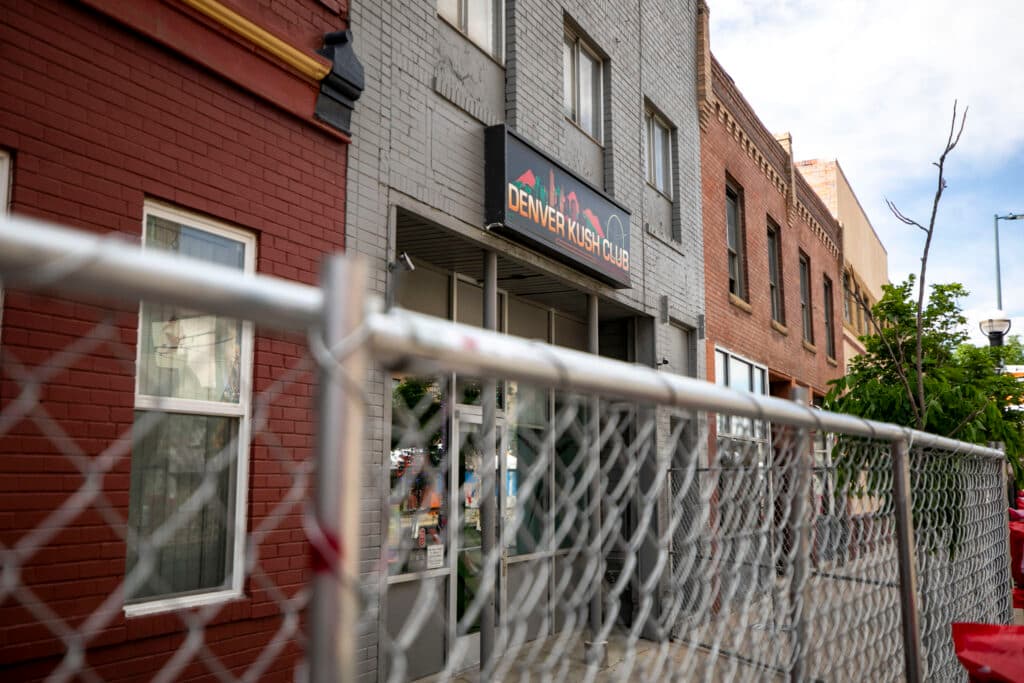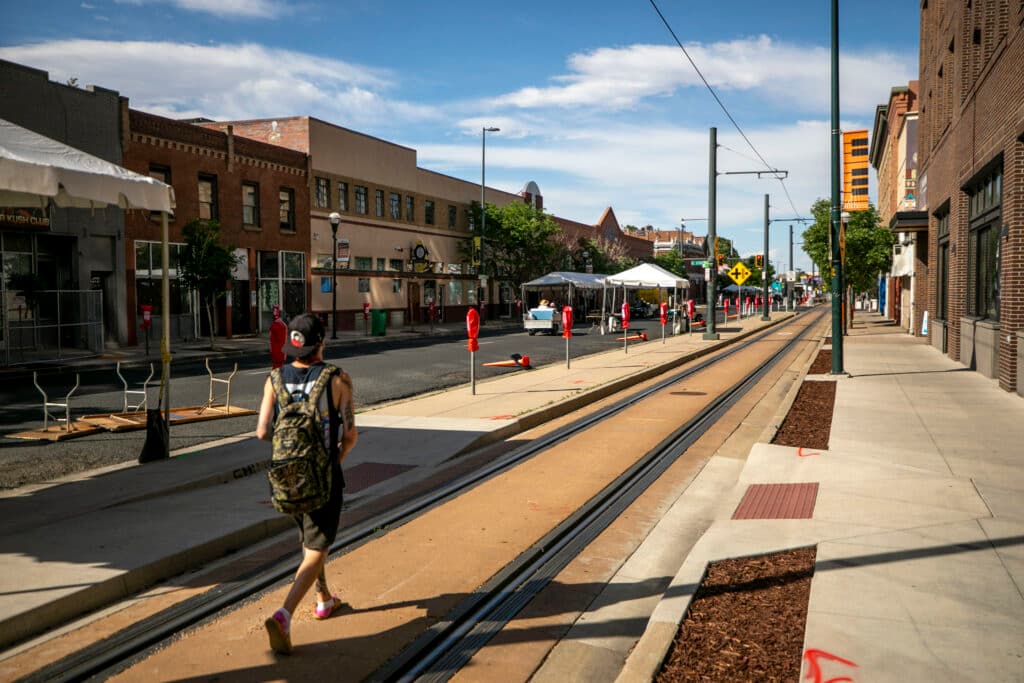Last weekend, as Denverites gathered on Welton Street to celebrate the iconic Five Points Jazz Festival, a customer approached Larry Benford, who sat fuming in the doorway of Courtesy Auto Services, a shop he’s run for more than three decades.
“Man, you look angry,” said the customer.
“I have right to be,” replied Benford.
“Why in the hell do they got you fenced in?” the customer asked.
“I would like to know the same thing,” Benford answered. “Why me?”
The Jazz Festival is one of several annual events in Five Points, a celebration of what was once dubbed the Harlem of the West, where iconic musicians played the bars and clubs and Black culture thrived.
This year, more than 30 acts played the weekend-long festival. People danced in the streets and venues. A main-stage hosted popular performers.
Denver dance legend and educator Cleo Parker Robinson and longtime KUVO Jazz General Manager Carlos Lando led a parade.
Longstanding community leaders like Rosalind “Bee” Harris, the owner and publisher of the Denver Urban Spectrum, were celebrated.
Families poured in for the fun at the Denver Arts and Venues-run, United Airlines-sponsored event that has long been billed as a boost to local businesses.

Meanwhile, some local business owners, like Benford, said they were fenced out of the celebrations.
Most weekend days Benford earns more than $1,500. During the festival, he said he made nothing. He expects the same to be true during the privately run Juneteenth Music Festival — one of the largest Juneteenth celebrations in the United States — in the week ahead.
Benford is one of several longstanding Five Points business owners who say that fences put up through the Denver neighborhood during the city’s Five Points Jazz Festival and Juneteenth are hurting sales.
He says he’s unique in that at least other businesses’ customers have some sort of access. His shop’s entirely cut off — and he doesn’t see a penny from the event organizers.
They insisted that he wasn’t really closed and that customers could get to him through the alley behind his shop. That didn’t pan out for two separate tow trucks trying to bring him cars to repair that were blocked by an illegally parked car blocking the alley.
He wishes that, with all the money exchanging hands during these events, some of it trickled down to businesses like his, which were effectively shuttered by the festivities.
“I don't mind if they close me down,” he said. “Just compensate me some kind of way. I'm not greedy, but, you know, just don't pinch me for no reason at all. Everybody else is making money but me.”
So what’s up with the fencing?
Brian Kitts, a spokesperson for Denver Arts & Venues, explained that fencing is the normal citywide practice for big festivals.
“Fencing is installed to ensure that the boundaries of the area included in the liquor license are secure,” he wrote Denverite. “This is standard in the festival business.”

Securing permitting for such events is a big undertaking, and requires permission from multiple city departments.
Organizers must secure a special event liquor license from the Department of Excise and Licenses, explained agency spokesperson Eric Escudero.
They also need a right-of-way occupancy permit for closing sidewalks and streets from the Department of Transportation and Infrastructure.
Patricia Yarber, who runs My Wine and Spirits Shoppe at 2741 Welton Street with her husband Matthew, says the fenced-off festival is keeping shoppers from her shop and stoking resentment between her business and others on the block.
“The fence is supposed to keep the people from coming into the function from our liquor store,” Patricia explained.
After all, the booze is much cheaper at My Wine and Spirits Shoppe than the city’s offerings.
“Their prices are ridiculous,” she said.
The fence gives the event’s booze vendors, all sourced from Colorado but not necessarily Five Points, an unfair advantage.
“I'm down here 364 days out of the year,” Patricia said. “And when we have functions, I'm not supposed to make some money off that? I mean real money. There's big money down there!”
Her store has to hire extra security and workers and even so, it can’t fully capitalize on the opportunities.
The city has tried to respond to the Yarbers’ concerns.
“In the case of the liquor store, the store is outside the fenced perimeter, but remains accessible from the street, and the Five Points crew installed an additional gate and guard to allow people leaving the festival easier access to the location,” Kitts noted.

One of Patricia’s frustrations is that customers can’t go from the festival, into her business and back to the event — at least, most of the time.
“Every year, we have a problem,” Patricia said. “Every year, the police sometimes, after a while, get tired of telling people and let them go in after a while. It's just a headache.”
And she worries about her shop’s reputation on the block among other business owners also frustrated by the fencing, since she’s been told the fencing is, in part, there to keep the liquor she sells out of the festival.
“I think they resent me,” Patricia said. “How fair is that for all the businesses that are there and people can't go to their stores because of my liquor store?”
The fence does affect other businesses on the block, said Maedella Stiger, a member of the Five Points Business Improvement District and co-owner of Franklin Stiger Afro Styling Barber Shop, a half-century-old business on the block.
But Stiger feels sorry for the Yarbers and their liquor store.
She remembers that back in the ‘60s, when the neighborhood hosted big events, there were no fences. Back then, local businesses were the ones involved — not United Airlines. And it was free to be a part of the fun.
During Juneteenth, the parade used to come down Welton Street and all the local businesses chose to participate.
“Now, people don’t even participate in the parade because they have to pay to participate,” she said. “And we never did that. Anybody that wanted to be in the parade, you could do that.”
She’s concerned that too many people are profiting from Five Points' cultural legacy without supporting the longtime Black-owned businesses in the community.

Stiger remembers jazz festivals, years ago, were Black-run community events. Then the city took over, and it’s not been the same since.
She’d rather the city host its jazz festival on the 16th Street Mall and leave Five Points alone.
“Go somewhere else,” she said. “Take your jazz someplace else, in some other area of town.”
Charles Foster, a longtime Five Points preservationist and history tour guide, is rallying the community to demand the city remove the fencing.
“It’s like a jail,” he said.
Foster wants to see businesses like the Yarbers’, the Roxy Theatre, Benford’s auto shop, and the Stigers’ barbershop thrive .
For that to happen, he said, the fence needs to be removed and the businesses need to be integrated into the celebrations.
“I think it's a lack of respect for the historical community,” he said. “I think this is a lack of respect for the business and property owners there. I think it's setting up a wall to prevent them from getting the financial benefits that they rightly, rightfully should get.”












